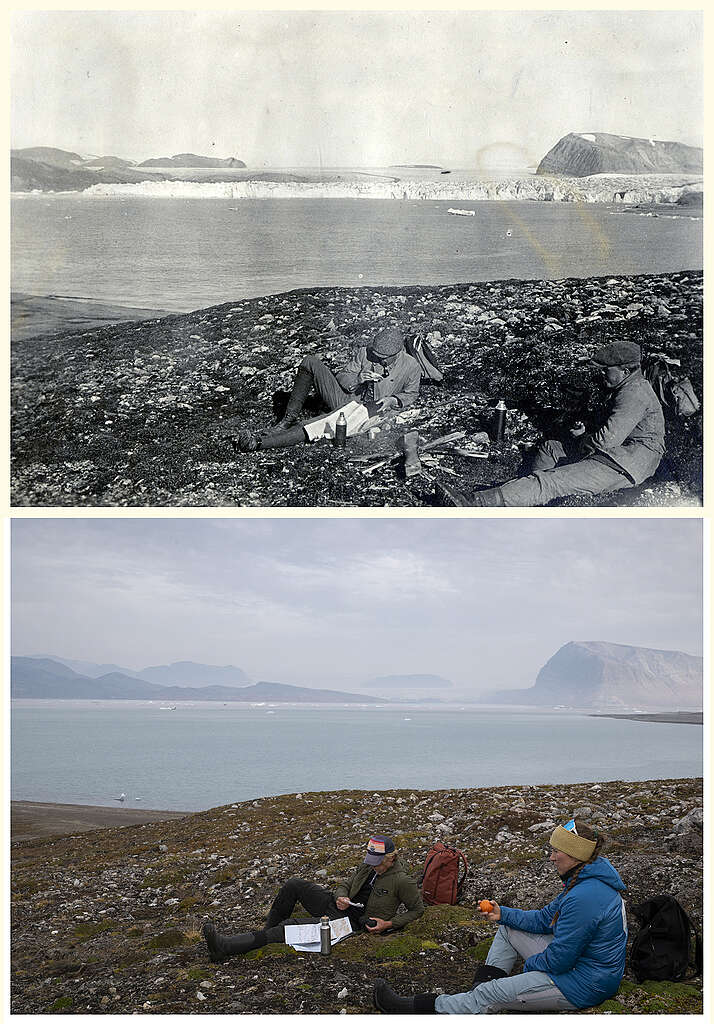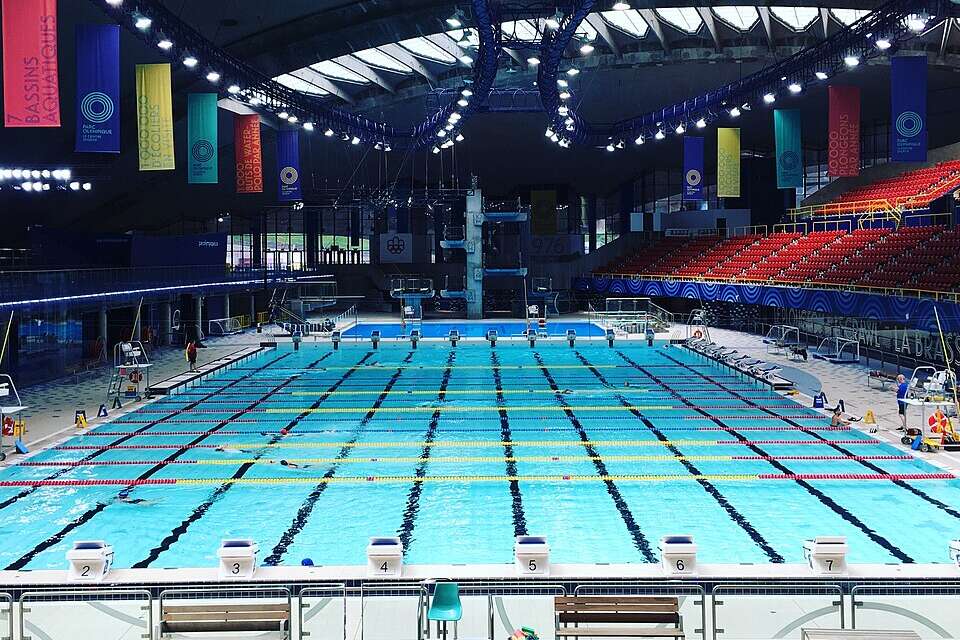Greenpeace Italy unveils Olympic rings leaking oil in Milan to call out fossil fuel sponsorship of Winter Games
Greenpeace International
Milan, Italy – This morning, Greenpeace Italy activists placed a large installation depicting the Olympic Rings dripping oil and the words “Sponsored by Eni” in Piazza Duomo in Milan, where the Olympic flame is expected to arrive today. Activists displayed banners reading “Kick polluters out of the Games”, in a protest against one of the Games’ major sponsors, Italian oil and gas giant Eni, whose greenhouse gas emissions threaten winters as they are currently known and the Winter Olympics and Paralympics themselves. Photos and videos of the Greenpeace Italy protest can be downloaded via the Greenpeace Media Library Greenpeace Italy climate campaigner Federico Spadini said, “It’s absurd that the Olympics and Paralympics are partnering with corporations whose emissions threaten the ice and snow that winter sports depend on. Oil and gas companies like Eni are driving the climate crisis, and it is unacceptable that its greenwashing operations have been allowed to tarnish the Olympic values of respect for people and the environment. That’s why Greenpeace is calling for the International Olympic Committee to drop oil and gas sponsorship from the Winter Olympic and Paralympic Games and commit to ending fossil fuel sponsorship across all Olympic Games.” According to recent analysis based on scientific modelling, Eni’s annual emissions could melt enough glacier ice to fill 2.5 million Olympic swimming pools.[1] In recent days, Greenpeace Italy and Greenpeace International sent an open letter to the International Olympic Committee (IOC) asking it to ban fossil fuel sponsorships, building on its legacy of banning tobacco advertising in 1988.[2] Greenpeace Italy has also released a video denouncing Eni’s impact on the Winter Games, featuring the same image of the Olympic Rings dripping oil, as that used in the Milan installation. ENDS Photos and videos of the Olympics Rings installation in Milan can be downloaded via the Greenpeace Media Library Notes: [1] https://www.nature.com/articles/s41558-018-0093-1 [2] The open letter to the International Olympic Committee Watch Greenpeace Italy’s Oilympics video here Contacts: Gaia Maione, Press Office Greenpeace Italy, +39 340 571 8019, gmaione@greenpeace.org Martin Zavan, Communications Specialist, Greenpeace International, +61 424 295 422, mzavan@greenpeace.org Greenpeace International Press Desk: +31 (0)20 718 2470 (available 24 hours), pressdesk.int@greenpeace.org Texte intégral (555 mots)
An oil and gas corporation killing winters with its planet-heating pollution is sponsoring the Winter Olympics. Could it be Eni more ironic?
Federico Spadini
We all want a world where winters remain a source of joy. A world where professional athletes and amateurs alike can count on snow and ice to pursue their passions, where children can play in the snow, and where iconic, international sporting events, like the Winter Olympics and Paralympics, continue to take place and inspire people. But the snowy scenes that provided a backdrop to so many of cherished childhood memories in Italy are under threat. The Games require the right set of conditions for competition to be safe and fair, and those very conditions are under threat from fossil fuel corporations, such as Italian oil and gas giant Eni, and their planet-heating operations. Now, in the days leading up to the 2026 Winter Olympics Milano Cortina, Greenpeace Italy has released a hard-hitting video that aims to cut through the noise and expose the threat that fossil fuels and the Games major sponsor, Eni, in particular, pose to the future of the Winter Olympics and Paralympics. The ‘Oilympics’ film shines a spotlight on Eni’s role in fuelling the climate crisis while highlighting our demand that the International Olympic Committee (IOC) ban all fossil fuel advertising and sponsorship, in order to protect the future of winter sports, and stop polluters from hijacking the Olympic spirit. Fossil fuel companies are greenwashing their image by sponsoring big sporting events to hide their destruction. Don’t let them get away with it. The short film exposes the irony of a company that is melting winter, sponsoring the Winter Games. Oil and gas corporations are driving the climate crisis, and at this rate by the 2080s over half of suitable locations will be unable to host the Winter Olympics. And Eni’s planet-heating pollution has a central role in this dour forecast. One year of Eni’s fossil fuel emissions could melt enough glacier ice to fill 2.5 million Olympic swimming pools. But the impacts go much further. Eni is currently suing Greenpeace Italy because it stated Eni harms people, after Greenpeace Netherlands calculated that Eni’s self-reported 2022 emissions could cause 27,000 excess deaths due to increased temperature alone before the end of the century. This was published in a 2023 study by Greenpeace Netherlands based on a peer-reviewed methodology. Given all of that, it’s no surprise that Eni actively seeks to hide these truths from the public, reportedly spending tens of millions of dollars on sporting sponsorships to soften its image. Buying an artificial association with the 2026 Winter Olympics in Milan and Cortina is part of that deceptive and cynical greenwashing strategy. Fossil fuel corporations, like Eni, should pay for the damage they cause, not buy reputational cover by associating themselves with Olympic values of excellence, respect, and friendship. Greenpeace supporters, nature lovers and the winter sports community are united in our desire to protect the Winter Olympics and Paralympics for present and future generations. The Olympic values of respect for people and the environment matter. Allowing Eni to use the Games as a billboard for greenwashing undermines those values and threatens the future of the event the IOC claims to support. Eni and the fossil fuel industry are driving climate change, which is jeopardising mountain communities already struggling with a rapidly changing climate, the livelihoods of many people who rely on cold winters, and the 60 million Europeans who ski every year. A better future is still within reach. The International Olympic Committee (IOC) can help lead the shift away from fossil fuels by refusing to be complicit in the deceptive practices of corporations like Eni who are stealing the winters that form the backdrop to so many precious childhood memories. This has happened before with tobacco advertising. Once the scientific consensus on the harms of smoking became too strong to ignore, the IOC banned tobacco advertising ahead of the 1988 Winter Olympics in Calgary. It played a key role in denormalising cigarette advertisements and set a strong precedent that was followed by sporting bodies and other event organisers around the world. It serves as a powerful testament to the power of the IOC to help shape policy at a global level and it shows that the same can be done with fossil fuel sponsorship and advertising. When iconic and influential sporting and cultural organisations like the Olympics choose integrity over greenwashing, they revoke polluters’ license to mislead and force them to face the harms they cause. That’s why Greenpeace is taking on fossil fuel corporations like Eni that are stealing our winters by shrinking snow seasons, collapsing glaciers and threatening the sports and traditions that millions of people cherish. Greenpeace is calling for the IOC to drop oil and gas sponsorship from the Winter Olympic and Paralympic Games, and commit to ending fossil fuel sponsorship across all Olympic Games. It benefits no one but oil and gas corporations; it distracts everyone from the environmental destruction they cause and the communities they harm and helps them avoid accountability. Fossil fuel companies are greenwashing their image by sponsoring big sporting events to hide their destruction. Don’t let them get away with it. Eni should be paying for the damage they have caused, not using sponsorships to polish their image while driving the climate crisis that threatens the future of winter sport. A future of icy cold winters with dependable snow is still possible, but like a glacier in the climate crisis, it’s melting before our eyes. Protecting the climate requires us to take on the forces that are destroying our winters and everything we love about them. That future is still possible if we change course now. Federico Spadini is a Greenpeace Italy Campaigner based in Milan, Italy. Texte intégral (2088 mots)
Oilympics: calling out Eni’s greenwashing

Who really pays for Eni’s greenwashing?
How do we stop oil corporations like Eni?

The climate crisis and the future of the Winter Olympics
Sophie Allain
More than half of the potential host cities Winter Games will be “climate-unreliable” by the 2080s! That’s the verdict of a rigorous 2024 scientific study funded by the International Olympic Committee (IOC) itself, confirming the importance of reducing greenhouse gas emissions. Experts Robert Steiger and Daniel Scott examined three different emissions scenarios and analysed the impacts on the weather in cities that could potentially host the Winter Olympics. They looked at the temperature and depth of snow. The results serve as a stark warning. Under the mid-range emission scenario (which is considered the most likely scenario), only 46 out of the 93 locations they looked into will be “climate reliable”. This means that there are far fewer places in the future where athletes could compete safely and fairly. This does not come as a surprise – in an earlier study the same researchers found that among 21 previous host cities, only one is projected to be reliable by the end of the century if global emissions remain on the trajectory of the past two decades. But this is not solely a problem for the future. In 2022, the Beijing Winter Olympics set a precedent as the first games to use 100% artificial snow. And the impacts of climate change on winter sports are not limited to the Olympics. The 2022/2023 Ski World Cup season started with warm weather and lack of snow, resulting in the International Ski Federation (FIS) cancelling or postponing seven out of first eight scheduled races. These incidents, plus a lack of snow for practice sessions, more injuries and reduced climate reliability of host cities, led over 500 athletes to sign an open letter demanding the FIS take greater climate action, with Greenpeace International lending support. This led the FIS to implement a series of reforms on Winter Olympic viability, nonetheless, the impact of fossil fuels remains. In a participant perspective survey involving around 400 Winter Olympic athletes, over 95% stated that climate change is/will negatively impact their sport, and winter sport culture in general by reducing training opportunities for the next-generation. Fossil fuel corporations use sports sponsorships to “polish” their image. They want us to see their logo next to world-class athletes to distract from how their business is driving the climate crisis that threatens those very sports. One such corporation is the Italian oil and gas giant, Eni, which is sponsoring the 2026 Winter Olympics and Paralympics in Milano and Cortina. That’s right, a company that is driving the climate crisis and putting winter sports at risk is using the Games to distract the public from its destructive impact. And much like the climate, the battle is heating up. Eni is currently in a legal battle with Greenpeace Italy. In 2023, Greenpeace Netherlands released a study applying the Mortality Cost of Carbon method, which projected that Eni’s self-reported emissions for 2022 alone could cause 27,000 temperature-related excess deaths by the end of the century. Instead of changing their business, Eni attempted to silence these legitimate criticisms by suing Greenpeace Italy. Lawyers call this a SLAPP (Strategic Lawsuit Against Public Participation) but in layman’s terms this is legal bullying and intimidation. To better understand the impact Eni’s emissions could have on ice, take a look at Eni’s own company reports. In 2024, Eni reported NET Greenhouse Gas lifecycle emissions of 395 million metric tonnes CO2e. Attribution science is becoming more and more accurate at estimating likely future harms from today’s carbon emissions. The shrinking of glaciers, for example, is widely accepted as evidence of climate change. Glacier mass loss has been reported to be related to temperature increase, which is known to have a direct relationship with cumulative carbon emissions. Scientific modelling shows that for every 1 kg of CO2 we put into the air, we eventually lose about 15.8 kg (5.9–20.5 kg) of glacier ice. When you apply that maths to the equivalent of Eni’s 2024 emissions, we are looking at a potential committed loss of 6.2 (2.3–8.1) billion tonnes of glacier ice over time. That’s a huge number, so let’s break it down into something we can see: Olympic-sized swimming pools. Imagine two and a half million swimming pools lined up – that’s the equivalent to the projected impact of one year of one company’s emissions. If these estimates shock you, you aren’t alone. We need to protect the future of winter sports by holding polluters accountable. Fossil fuel companies should be paying for the damage they cause through taxes and fines, not using our favorite sports to hide their impact. That’s why Greenpeace is calling for the International Olympic Committee (IOC) to drop oil and gas sponsorship from the Winter Olympic and Paralympic Games – and commit to ending fossil fuel sponsorship across all Olympic Games. Fossil fuel companies are greenwashing their image by sponsoring big sporting events to hide their destruction. Don’t let them get away with it. This has happened before with tobacco advertising. Once the scientific consensus on the harms of smoking became too strong to ignore, the IOC banned tobacco advertising ahead of the 1988 Winter Olympics in Calgary. It played a key role in denormalising cigarette advertisements and set a strong precedent that was followed by sporting bodies and other event organisers around the world. It serves as a powerful testament to the power of the IOC to help shape policy at a global level and it shows that the same can be done with fossil fuel sponsorship and advertising. Fossil fuel sponsorship benefits no one but oil and gas corporations; it distracts everyone from the environmental destruction they cause and the communities they harm. Fossil fuel corporations must be phased out as part of a just transition to renewable energy, not using sponsorships to polish their image while driving the climate crisis that threatens the future of winter sport. Sophie Allain is a campaigner at Greenpeace International and is based in London, UK. Texte intégral (2750 mots)
Fake snow and cancelations
Safety
The problem with “sportwashing”

Doing the maths: Emissions and glaciers
Trying to visualise the damage

How you can help to hold oil and gas corporations accountable

Note: This article was edited on 3 January at 18.45 CET to clarify two figures related to glacier ice loss.Sources:
Bon Pote
Actu-Environnement
Amis de la Terre
Aspas
Biodiversité-sous-nos-pieds
Bloom
Canopée
Décroissance (la)
Deep Green Resistance
Déroute des routes
Faîte et Racines
Fracas
F.N.E (AURA)
Greenpeace Fr
JNE
La Relève et la Peste
La Terre
Le Lierre
Le Sauvage
Low-Tech Mag.
Motus & Langue pendue
Mountain Wilderness
Negawatt
Observatoire de l'Anthropocène

 (@greenpeace)
(@greenpeace)